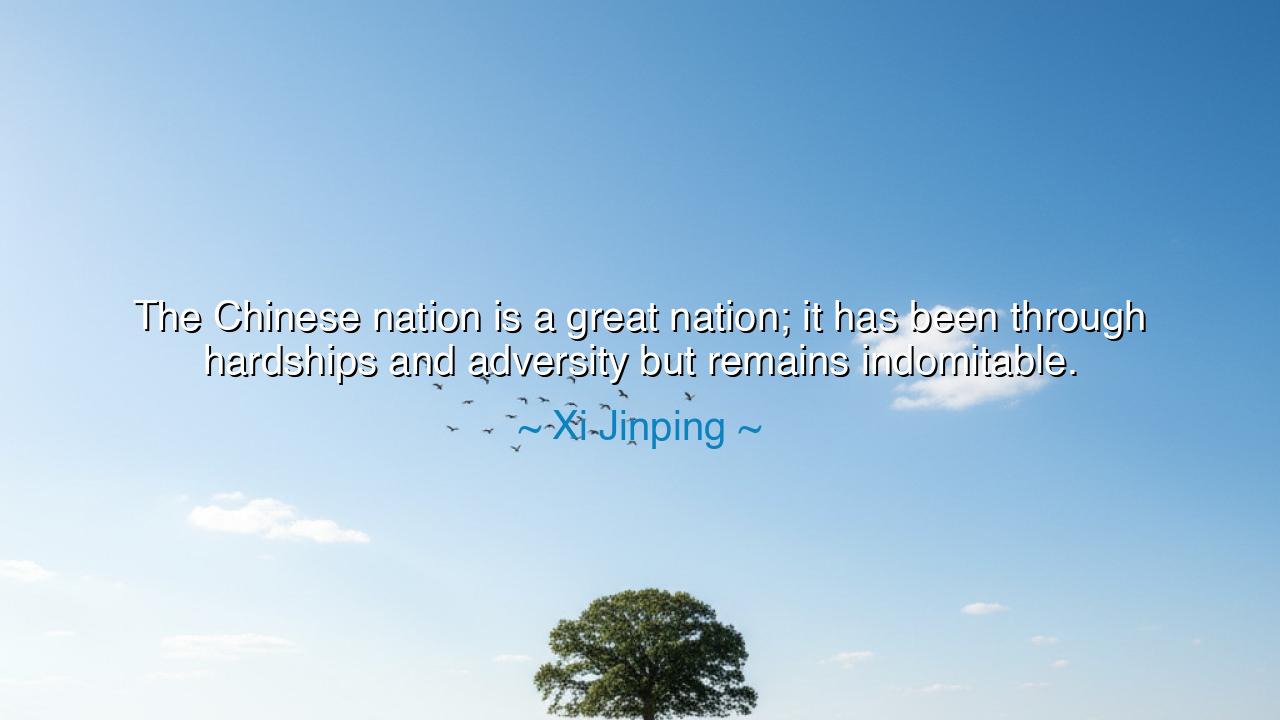
The Chinese nation is a great nation; it has been through
The Chinese nation is a great nation; it has been through hardships and adversity but remains indomitable.






In a voice that carried the weight of history and the pride of countless generations, Xi Jinping, the leader of modern China, declared: “The Chinese nation is a great nation; it has been through hardships and adversity but remains indomitable.” These words are not merely the echo of patriotism — they are the distilled spirit of a civilization that has endured the tides of time, fire, and conquest. In them lives the essence of resilience, the unbroken will of a people who, though tested again and again, have never bent beneath the storm. This statement stands as both remembrance and vow — an ode to the past and a beacon for the future.
The origin of this quote lies in Xi Jinping’s vision for what he calls the “great rejuvenation of the Chinese nation.” It was spoken in the context of China’s long and turbulent history — a history that spans more than five thousand years of glory, invention, division, and rebirth. From the earliest dynasties that shaped philosophy, governance, and art, to the centuries of struggle against invasion, war, and humiliation, China has endured suffering without surrender. In this declaration, Xi honors that lineage of perseverance, proclaiming that the spirit of China — though bruised by history’s trials — remains alive, steadfast, and unconquerable.
To say that the Chinese nation “has been through hardships and adversity” is to acknowledge one of the most arduous journeys of any civilization. The invasions of nomadic tribes, the chaos of civil war, the fall of dynasties, the scars of foreign occupation, and the struggles of poverty and rebuilding — all could have broken a lesser people. Yet, through each trial, the Chinese found strength not in denial, but in endurance. The concept of indomitability runs deep in Chinese philosophy — from Confucius, who taught that moral strength lies in persistence, to Mencius, who said, “When Heaven is about to confer a great responsibility upon a man, it first tests his will with suffering.” So too has Heaven tested the Chinese nation, and yet it stands, weathered but unwavering.
History offers countless examples of this indomitable spirit. Consider the Long March of 1934–1935, when the Red Army, pursued and starved, traversed over nine thousand kilometers of treacherous mountains and swamps. Out of ninety thousand who began, only a fraction survived. Yet those who did would one day lay the foundation of a new China. The Long March became more than a military retreat — it became a symbol of endurance, proof that no hardship could extinguish the flame of belief. It was through that crucible of suffering that modern China was forged, embodying the same resilience that Xi Jinping celebrates in his words.
But this resilience is not only military or political; it is cultural and spiritual. The Chinese civilization has faced centuries of change — the burning of libraries, the loss of kingdoms, the shattering of traditions — and yet, like the bamboo that bends but does not break, it endures. When the flames of war consumed its cities, the scholars rebuilt their scrolls. When famine struck, the farmers planted anew. When foreign powers sought to humiliate the nation, its people turned their pain into resolve. The indomitable nature Xi speaks of is the continuity of this unyielding soul — the belief that so long as one generation breathes, the dream of renewal remains alive.
Yet in Xi’s words there is more than pride — there is a mandate for responsibility. To proclaim the greatness of one’s nation is not to bask in past glory, but to honor it through action. The Chinese people are heirs to an ancient spirit; they must also be its stewards. The greatness that has survived adversity must now be guided by wisdom, unity, and compassion. For strength without virtue becomes tyranny, and pride without humility becomes folly. True national greatness lies not in dominance, but in the ability to uplift, to contribute to the world, and to remain steadfast in the pursuit of harmony.
The lesson, then, is not confined to China alone — it belongs to all humanity. Every people, every person, faces moments of hardship that threaten to break them. But as the Chinese nation has shown, adversity is not the end — it is the forge of endurance. Whether one stands as an individual or as a nation, greatness is not inherited; it is earned through struggle and preserved through integrity. The measure of one’s strength lies not in avoiding suffering, but in transforming it into purpose.
So, my children of the future, remember the wisdom in Xi Jinping’s words. When darkness descends and the world seems unkind, look to the example of those who came before you — the indomitable ones who refused to yield. Let hardship be your teacher, not your master. Let adversity test your courage, not your faith. For greatness is not the absence of struggle, but the refusal to be conquered by it. And when you rise again, stronger and wiser, you too will carry forward the eternal flame of the indomitable spirit — the spirit that no force, no storm, and no age can ever extinguish.






AAdministratorAdministrator
Welcome, honored guests. Please leave a comment, we will respond soon